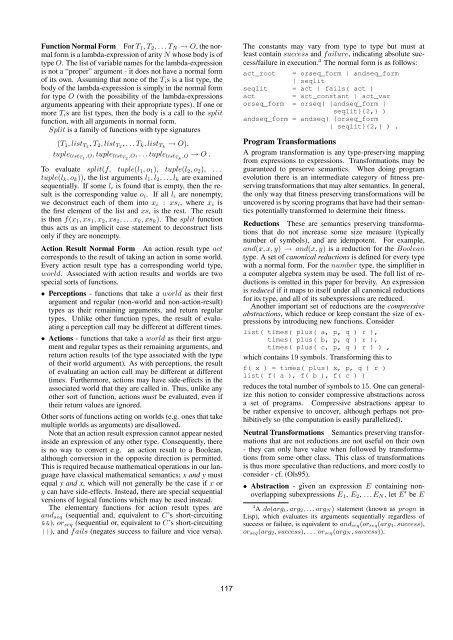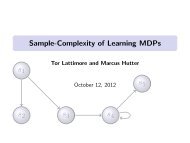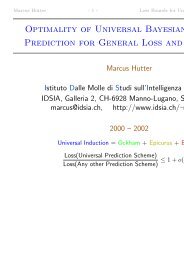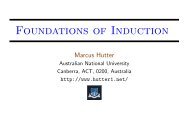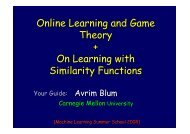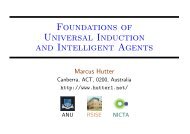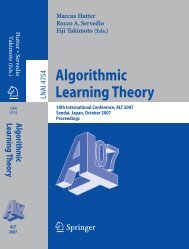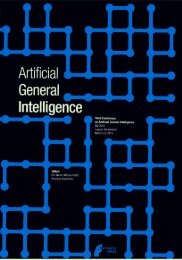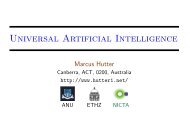A Framework for Evaluating Early-Stage Human - of Marcus Hutter
A Framework for Evaluating Early-Stage Human - of Marcus Hutter
A Framework for Evaluating Early-Stage Human - of Marcus Hutter
Create successful ePaper yourself
Turn your PDF publications into a flip-book with our unique Google optimized e-Paper software.
Function Normal Form For T1, T2, . . . TN → O, the normal<br />
<strong>for</strong>m is a lambda-expression <strong>of</strong> arity N whose body is <strong>of</strong><br />
type O. The list <strong>of</strong> variable names <strong>for</strong> the lambda-expression<br />
is not a “proper” argument - it does not have a normal <strong>for</strong>m<br />
<strong>of</strong> its own. Assuming that none <strong>of</strong> the Tis is a list type, the<br />
body <strong>of</strong> the lambda-expression is simply in the normal <strong>for</strong>m<br />
<strong>for</strong> type O (with the possibility <strong>of</strong> the lambda-expressions<br />
arguments appearing with their appropriate types). If one or<br />
more Tis are list types, then the body is a call to the split<br />
function, with all arguments in normal <strong>for</strong>m.<br />
Split is a family <strong>of</strong> functions with type signatures<br />
(T1, listT1 , T2, listT2 , . . . Tk, listTk → O),<br />
tuplelistT 1 ,O, tuplelistT 2 ,O, . . . tuplelistT k ,O → O .<br />
To evaluate split(f, tuple(l1, o1), tuple(l2, o2), . . .<br />
tuple(lk, ok)), the list arguments l1, l2, . . . lk are examined<br />
sequentially. If some li is found that is empty, then the result<br />
is the corresponding value oi. If all li are nonempty,<br />
we deconstruct each <strong>of</strong> them into xi : xsi, where xi is<br />
the first element <strong>of</strong> the list and xsi is the rest. The result<br />
is then f(x1, xs1, x2, xs2, . . . xk, xsk). The split function<br />
thus acts as an implicit case statement to deconstruct lists<br />
only if they are nonempty.<br />
Action Result Normal Form An action result type act<br />
corresponds to the result <strong>of</strong> taking an action in some world.<br />
Every action result type has a corresponding world type,<br />
world. Associated with action results and worlds are two<br />
special sorts <strong>of</strong> functions.<br />
• Perceptions - functions that take a world as their first<br />
argument and regular (non-world and non-action-result)<br />
types as their remaining arguments, and return regular<br />
types. Unlike other function types, the result <strong>of</strong> evaluating<br />
a perception call may be different at different times.<br />
• Actions - functions that take a world as their first argument<br />
and regular types as their remaining arguments, and<br />
return action results (<strong>of</strong> the type associated with the type<br />
<strong>of</strong> their world argument). As with perceptions, the result<br />
<strong>of</strong> evaluating an action call may be different at different<br />
times. Furthermore, actions may have side-effects in the<br />
associated world that they are called in. Thus, unlike any<br />
other sort <strong>of</strong> function, actions must be evaluated, even if<br />
their return values are ignored.<br />
Other sorts <strong>of</strong> functions acting on worlds (e.g. ones that take<br />
multiple worlds as arguments) are disallowed.<br />
Note that an action result expression cannot appear nested<br />
inside an expression <strong>of</strong> any other type. Consequently, there<br />
is no way to convert e.g. an action result to a Boolean,<br />
although conversion in the opposite direction is permitted.<br />
This is required because mathematical operations in our language<br />
have classical mathematical semantics; x and y must<br />
equal y and x, which will not generally be the case if x or<br />
y can have side-effects. Instead, there are special sequential<br />
versions <strong>of</strong> logical functions which may be used instead.<br />
The elementary functions <strong>for</strong> action result types are<br />
andseq (sequential and, equivalent to C’s short-circuiting<br />
&&), orseq (sequential or, equivalent to C’s short-circuiting<br />
||), and fails (negates success to failure and vice versa).<br />
117<br />
The constants may vary from type to type but must at<br />
least contain success and failure, indicating absolute success/failure<br />
in execution. 4 The normal <strong>for</strong>m is as follows:<br />
act_root = orseq_<strong>for</strong>m | andseq_<strong>for</strong>m<br />
| seqlit<br />
seqlit = act | fails( act )<br />
act = act_constant | act_var<br />
orseq_<strong>for</strong>m = orseq( {andseq_<strong>for</strong>m |<br />
seqlit}{2,} )<br />
andseq_<strong>for</strong>m = andseq( {orseq_<strong>for</strong>m<br />
| seqlit}{2,} ) .<br />
Program Trans<strong>for</strong>mations<br />
A program trans<strong>for</strong>mation is any type-preserving mapping<br />
from expressions to expressions. Trans<strong>for</strong>mations may be<br />
guaranteed to preserve semantics. When doing program<br />
evolution there is an intermediate category <strong>of</strong> fitness preserving<br />
trans<strong>for</strong>mations that may alter semantics. In general,<br />
the only way that fitness preserving trans<strong>for</strong>mations will be<br />
uncovered is by scoring programs that have had their semantics<br />
potentially trans<strong>for</strong>med to determine their fitness.<br />
Reductions These are semantics preserving trans<strong>for</strong>mations<br />
that do not increase some size measure (typically<br />
number <strong>of</strong> symbols), and are idempotent. For example,<br />
and(x, x, y) → and(x, y) is a reduction <strong>for</strong> the Boolean<br />
type. A set <strong>of</strong> canonical reductions is defined <strong>for</strong> every type<br />
with a normal <strong>for</strong>m. For the number type, the simplifier in<br />
a computer algebra system may be used. The full list <strong>of</strong> reductions<br />
is omitted in this paper <strong>for</strong> brevity. An expression<br />
is reduced if it maps to itself under all canonical reductions<br />
<strong>for</strong> its type, and all <strong>of</strong> its subexpressions are reduced.<br />
Another important set <strong>of</strong> reductions are the compressive<br />
abstractions, which reduce or keep constant the size <strong>of</strong> expressions<br />
by introducing new functions. Consider<br />
list( times( plus( a, p, q ) r ),<br />
times( plus( b, p, q ) r ),<br />
times( plus( c, p, q ) r ) ) ,<br />
which contains 19 symbols. Trans<strong>for</strong>ming this to<br />
f( x ) = times( plus( x, p, q ) r )<br />
list( f( a ), f( b ), f( c ) )<br />
reduces the total number <strong>of</strong> symbols to 15. One can generalize<br />
this notion to consider compressive abstractions across<br />
a set <strong>of</strong> programs. Compressive abstractions appear to<br />
be rather expensive to uncover, although perhaps not prohibitively<br />
so (the computation is easily parallelized).<br />
Neutral Trans<strong>for</strong>mations Semantics preserving trans<strong>for</strong>mations<br />
that are not reductions are not useful on their own<br />
- they can only have value when followed by trans<strong>for</strong>mations<br />
from some other class. This class <strong>of</strong> trans<strong>for</strong>mations<br />
is thus more speculative than reductions, and more costly to<br />
consider - cf. (Ols95).<br />
• Abstraction - given an expression E containing nonoverlapping<br />
subexpressions E1, E2, . . . EN, let E ′ be E<br />
4 A do(arg1, arg2, . . . argN ) statement (known as progn in<br />
Lisp), which evaluates its arguments sequentially regardless <strong>of</strong><br />
success or failure, is equivalent to andseq(orseq(arg1, success),<br />
orseq(arg2, success), . . . orseq(argN , success)).


